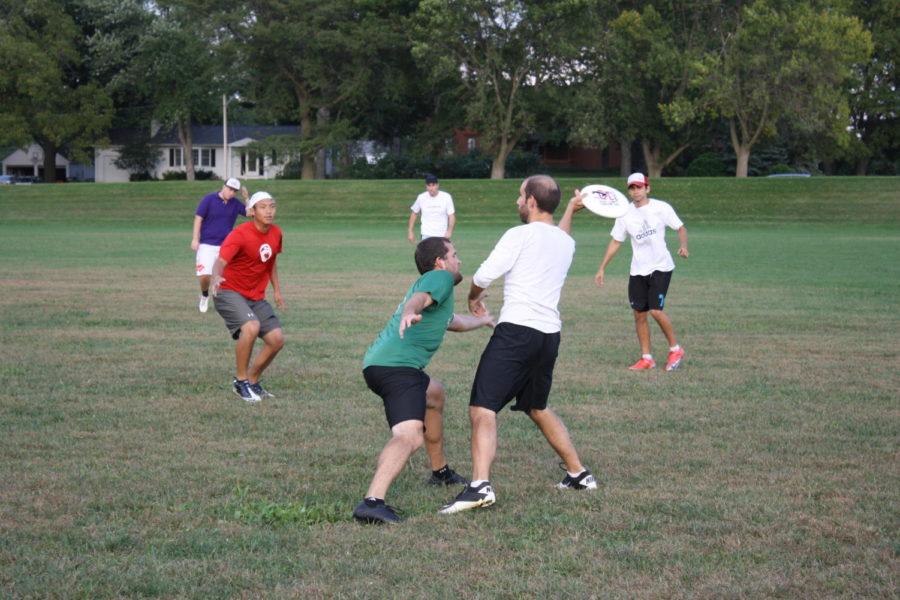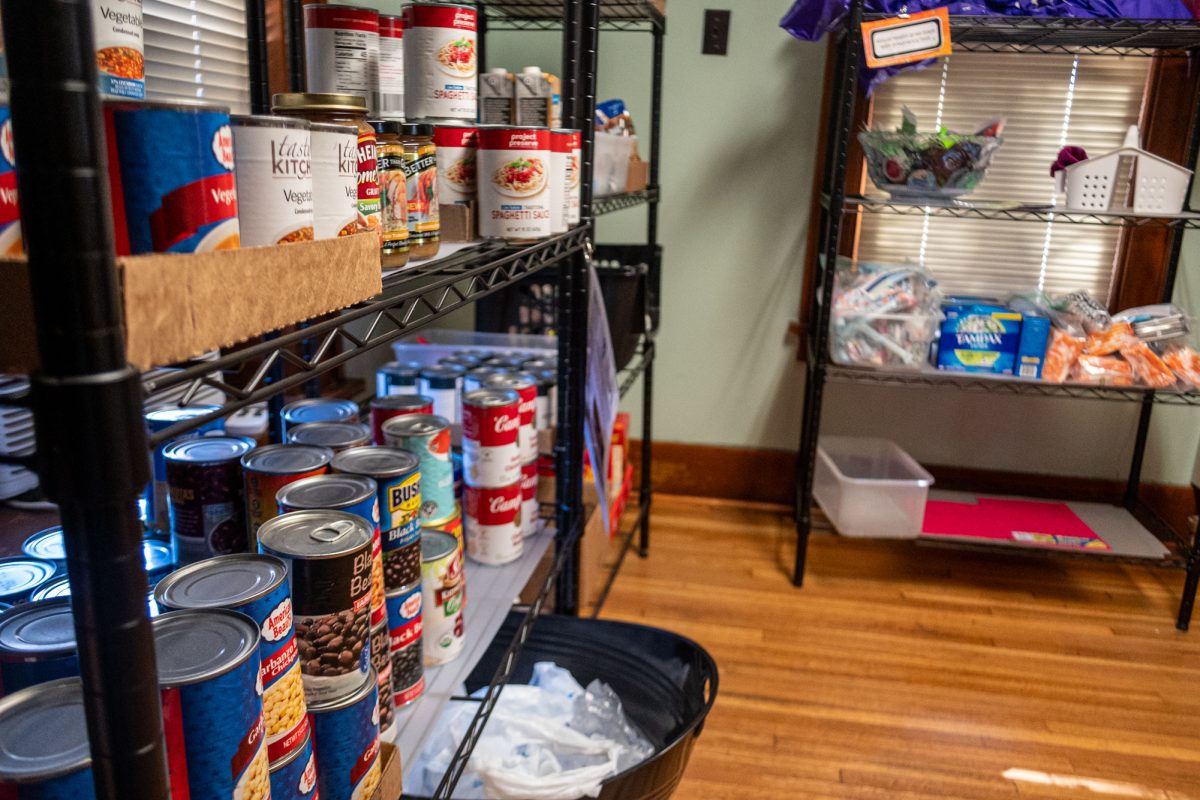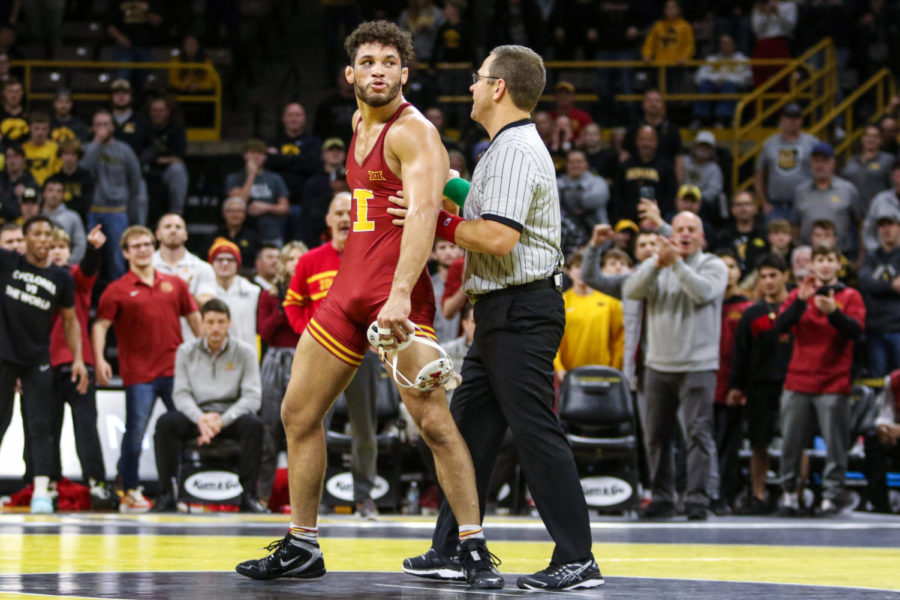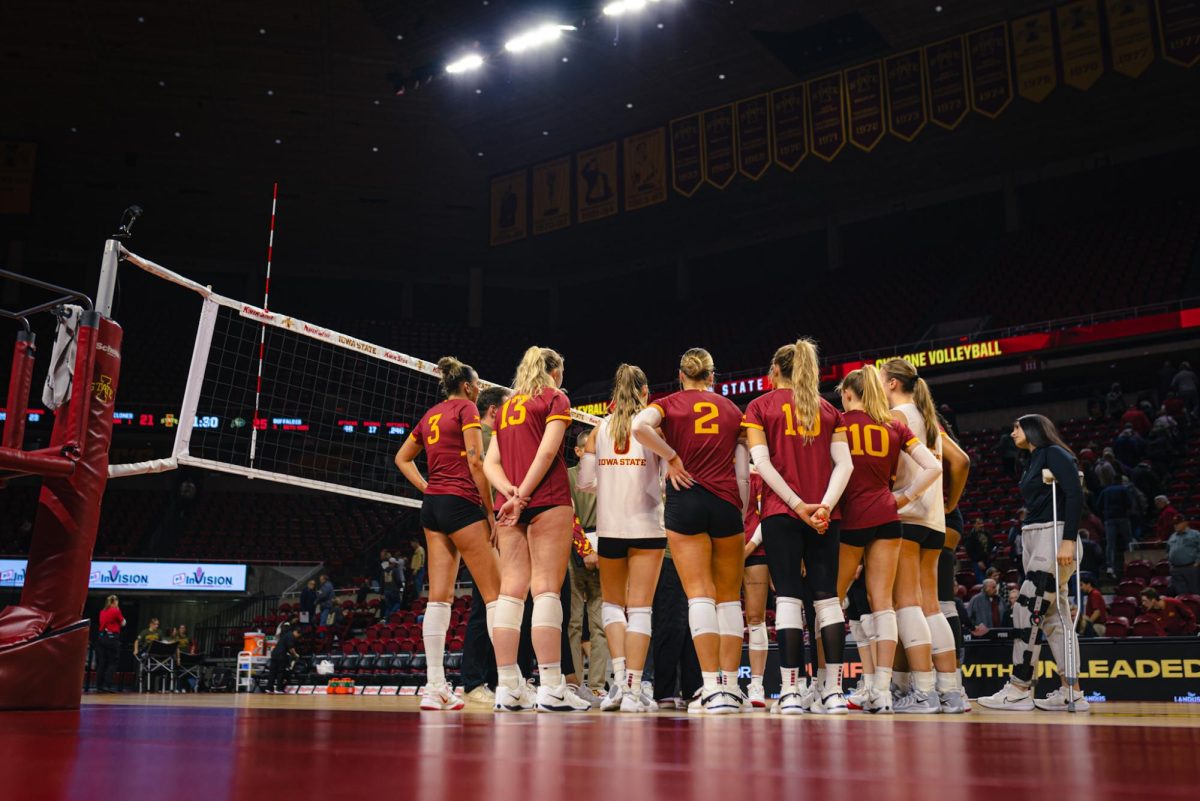Iowa State Alumni earn gold at World Ultimate Championships
Photo: Kait McKinney/Iowa State Daily
Ultimate participants fight for the disc Wednesday, Sept. 15. The Chad Larson Experience, a team made up of members from around the country including ISU alumni, won the World Ultimate Championships in Prague, Czech Republic this summer.
September 15, 2010
This summer, an Ames-based Ultimate team made up mostly of ISU alumni competed at the World Ultimate Championship in Prague, Czech Republic.
And they won.
A first place finish at the World Championship is an impressive feat, but what makes this “farmer-tanned team” so unique isn’t the gold medal; it’s how they got there.
It’s the story of Chad Larson.
The Chad Larson Experience began in 2003 on our very own campus.
A young man by the name of Chad Larson had an itch for the game of ultimate frisbee that needed to be scratched. Intramurals provided Larson with the chance to perfect his game, and a love affair began between him and his flying disc.
Larson earned his diploma in 2003 and decided to try his luck living in Texas, and although he left Cyclone country behind, he never lost his love of Ultimate.
Weeks passed, and Larson had yet to find a group that shared the enthusiasm for his favorite sport. So, he decided to form a team of his own.
One day at practice, Larson and his teammates were discussing what to call their new found frisbee family.
“We should call it ‘Chad’s Team,'” Larson said at the time.
Amongst the group was a man named Bob Burns, former director of the governing body of U.S. Ultimate.
“Chad, no team named after you will ever be good,” Burns said.
News traveled back to Kevin Seiler, friend of Larson and captain of the ISU Ultimate club. The Frisbee-throwing Cyclones decided to honor their friend and former teammate.
Since that day in 2003, the Chad Larson Experience — or CLX — has been evolving into the team it is today, and is considered the team to beat in the international sport of Ultimate.
Ultimate has been growing in popularity on college campuses across the country. Iowa State has both men’s and women’s teams who compete regionally with other schools.
CLX is a club team, meaning it’s registered with the United States National Ultimate Association. The competition is intense and players take the game very seriously. Teams travel across the globe to find their next challenge on the field.
“[We] did pretty well our first season,” said Jon Staron, a member of CLX since its founding in 2003. “The next year we made Nationals and got second place. [It was] kind of as a surprise to everyone that was there.”
The first international exposure for CLX was in 2006, when it traveled to Australia for the World Ultimate Club Championships. A 10th place finish put a damper on the team’s morale, and it would be three years before it would play again as a group.
“The team kind of broke up in 2006,” said team member Kurt Brorsen. “We split into a men’s and women’s team. Those teams made nationals, but didn’t do so well.”
Staron said the trip to Australia was the first time many CLX members had been out of the country. The young team failed to prepare mentally or physically for international competition and walked away with a less-than-pleasing outcome.
“We lost a lot of close games in that tournament,” Staron said. “There were five games where it came down to one point. We lost four of them.”
The break-up proved only temporary, as the team reunited in 2009 and earned silver at the national tournament. That second-place finish was CLX’s ticket to Prague.
Practice makes perfect?
In order to go from college club team to World Champions, practice was key. But CLX has an unusual practice regime — “unusual” meaning non-existent.
“There’s a lot of teammates we only see at tournaments,” Brorsen said.
Members of CLX come from all across the country, ranging from Marshalltown to Minneapolis and even Boston.
“We don’t have formal practices like [the ISU club teams],” Brorsen said. “If we want to practice, we drag the college guys out and we really just play ultimate.”
Preparation was intense for the summer Championships. Practice started in February with sprints and dry-land training twice a week.
Once the snow melted, teammates close to Ames started having regular pick-up games at the Tower Intramural Fields.
Regular e-mails kept each member of CLX up-to-date on everything from training to travel itinerary.
One thing Gmail lacked was the ability to practice any offensive or defensive plays.
“It’s a lot of working on your own,” Brorsen said. “Most teams run real offenses and real defenses. We go out there and rely on being athletic.”
Whatever CLX did, it worked.
Opening ceremonies for the 2010 World Championships took place July 4. It was the first chance the team had to check out the 39 teams hoping to see CLX lose.
During the next week, they played 11 games and had 11 chances to prove they were going to finish at the top.
The final game matched CLX with Canada’s ONYX, a team whom they had defeated only days before by a score of 15-8.
Almost instantly, a goal by Seiler gave the team from Ames control of the board and they had no intention of giving it back.
Ninety minutes later, after hours of training, months of waiting and years of dreaming, the Chad Larson Experience knew what it felt like to be the best in the world. Brorsen scored the game ending goal, bringing the final to CLX-17, ONYX-10.
“It was nice to win after tasting defeat so many times in big games,” Seiler said.
Jasmine Draper is a recent ISU graduate and one of the youngest players on CLX. She explained why it was possible to go from a finisher’s ribbon to gold medal.
“[We’re] more athletic,” Draper said. “We have knowledge for the game. Most of us have been playing for three to four years plus, so we know Ultimate pretty well.”
With age comes wisdom.
Jon Staron is 27 and remembers a longer period than Draper.
“More like nine, 10 years plus,” Staron said.
The team has close to a century of Ultimate between them, proving that with age comes wisdom.
The trend seems that Ultimate is a sport requiring lots of time, practice and even more dedication. The older members explained how most don’t see their skills fully develop until after college, or senior year at the earliest.
For those wanting to hone their skills and see if Ultimate is the sport for them, Draper said to check out the intramural teams.
She fell into the sport her sophomore year of college and has never looked back. She now coaches the women’s Ultimate team in addition to playing on CLX.
“I wasn’t heavily recruited,” Draper said. “A good friend on the team brought me [to a practice]. It’s just … you come to one practice and you’re kind of hooked.”
What has happened to Chad Larson?
He’s still living in Texas, still playing recreational Ultimate. But when asked whether or not he’ll ever play with CLX, the unanimous answer is “no.”
“He actually sucks,” Staron said with a laugh. “[Bob] Burns was totally right.”







